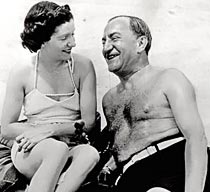
Had you passed by this old-timer lounging on the sands of Miami Beach with his wife back in 1954, you probably wouldn’t have given it a second thought. And you surely wouldn’t have thought to yourself: “Hey, that’s the guy who was responsible for shaping social attitudes in American society through much of the twentieth century.” But, had you done so, you would have been right.
Nicholas M. Schenck was a Russian immigrant who rose from selling newspapers on the streets of Harlem to become head of arguably the most influential film company in the history of cinema — MGM/Loews Theatres.
At one time, Loews owned or controlled over 200 movie theatres in America and those theatres were kept stocked with at least one new feature-length movie each week — 52 a year on average — by its subsidiary, MGM Studios in Hollywood, and it was Nick Schenck who was largely responsible for deciding what pictures were produced and shown to the public in Loews’ movie theatres.
Hollywood moguls like Louis B. Mayer and Irving Thalberg worked for Nick Schenck and referred to him as “The General.” Nothing in Hollywood went forward until it was green-lighted from Schenck’s office in New York. The careers of Joan Crawford, Jean Harlow, Clark Gable, Spencer Tracy, Katharine Hepburn, Judy Garland and thousands of others rose or fell with a simple word from Schenck. His pre-release critique of a movie was often short and to-the-point. He once shot-down the release of a movie that was supposed to have a sentimental theme by simply pointing to his throat and saying “No lumps here,” which was enough to force the movie back into production for further refinement.
With no television or internet available, it’s hard to overstate just how much influence the movies had on American society from 1930 to 1950 when TV finally came on the scene. Movies not only influenced clothing and hair styles, but social values as well.
Patriotic-themed movies helped shape American attitudes during World War II. Attitudes toward the family, immigration, religion — all were influenced by the movies to a much larger degree than today. RKO’s ten minute short film “The House I Live In” where Frank Sinatra publicly opposed anti-Semitism and racial prejudice at the end of World War II is a shining example of film’s blatant influence on public opinion. Nick Schenck was one of only a handful of people who decided what the public saw on America’s movie screens.
After he retired, Schenck divided his time between his 20-acre, 30-room estate at Sands Point, Long Island which included its own movie theater, and his estate here in Miami Beach.
I find it quite interesting that a guy who’d spent his entire life in the midst of Hollywood glamour would choose Miami Beach to live out his remaining days.
Nicholas M. Schenck died in Miami Beach in 1969.
